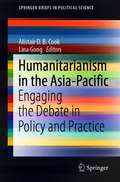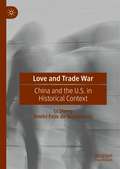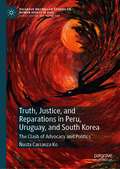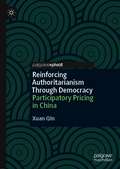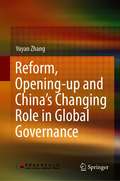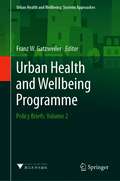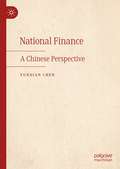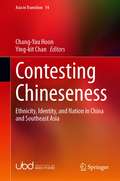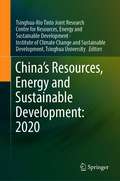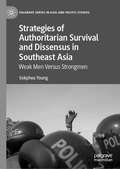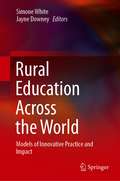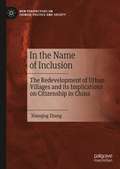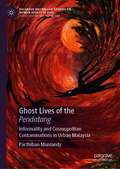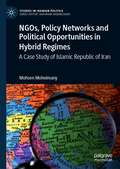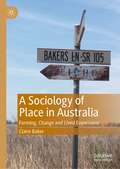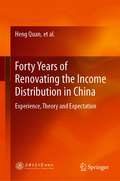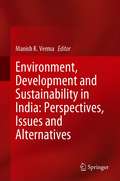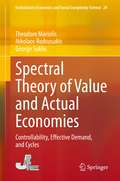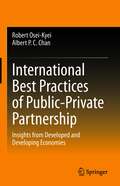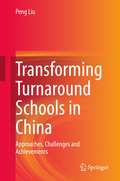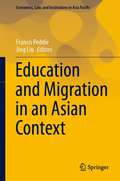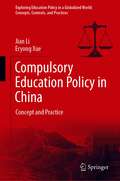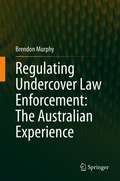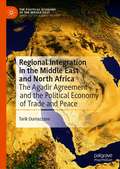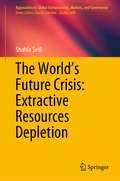- Table View
- List View
Humanitarianism in the Asia-Pacific: Engaging the Debate in Policy and Practice (SpringerBriefs in Political Science)
by Alistair D. B. Cook Lina GongThis collection offers insights of the international humanitarian system, considering what constitutes humanitarianism in Asia-Pacific, and how it shapes policy and practice in the region and globally. It adds to the conversation on reforming the global humanitarian system by providing the space to share perspectives on humanitarian action from our place in the world. The authors answer these questions by focusing on a range of issues from national to sectoral perspectives to relations between ‘traditional’ and ‘emerging’ players, concluding that the dynamics of the humanitarian system from the perspectives of the Asia-Pacific are rooted in their localized experiences and built outwards. The first significant trend is that understandings of humanitarianism in the Asia-Pacific are primarily shaped by the experience of disasters at home. Second, national governments play a dominant role in humanitarian affairs in the region. Finally, the humanitarian landscape in the Asia-Pacific constitutes a diverse yet under-appreciated set of actors. This book is based on the RSIS Conference on Asia and the Humanitarian World held in 2019 in Singapore. It is relevant to students, scholars, practitioners and policymakers with an interest in humanitarian assistance, disaster management, strategic studies and international relations in Asia-Pacific.
Love and Trade War: China and the U.S. in Historical Context
by Dmitri Felix do Nascimento Li ShengThis book puts the trade war between the United States and China in historical context. Exploring the dynamics of isolation and internal reform from a Chinese perspective, the author draws upon valuable insights from China's years of isolation prior to the famous Nixon-Mao summit. Advocating internal reform as a more productive strategy than conflict with other powers, this powerful argument for globalization with Chinese characteristics will be of interest to scholars of China, economists, and political scientists.
Truth, Justice, and Reparations in Peru, Uruguay, and South Korea: The Clash of Advocacy and Politics (Palgrave Macmillan Studies on Human Rights in Asia)
by Ñusta Carranza KoThis book presents the first cross-regional analysis of post-transitional justice periods and the conditions that influence states’ behaviors. Specifically, the book examines why states that adopt and ostensibly implement transitional justice norms as policies—criminal prosecutions, reparations policies, and truth commissions—fail to follow through with their recommendations. Applying these perspectives to a comparative study of states from Latin America and East Asia—namely, Peru, Uruguay, and South Korea—which accepted and implemented transitional justice norms but took different trajectories of behavior after the implementation of policies, this book contributes to understanding the relationship of norm influence on states and why states change in compliance after norm adoption. The book explores the conditions that contribute or limit the continued respect for transitional justice norms, emphasizing the political interests and transnational advocacy networks’ roles in affecting states’ policies of addressing past abuses.
Reinforcing Authoritarianism Through Democracy: Participatory Pricing in China
by Xuan QinThis book provides empirical evidence to show how democratic experiments are harnessed to achieve control and support authoritarianism, through the lens of participatory pricing, which is one of the most important forms of deliberative democracy in China. The crucial point is an interlacement of easily perceptible improvement in empowerment (voluntary enrollment, disclosure of information and opportunities for expression during events) and hidden control (delicately designed procedures and pre-existing frameworks that influence participants in how they think, and when they talk).The mixture of these two mechanisms assures participants and educates them, producing cooperative citizens desired by the government. This is referred to as the partial empowerment strategy, which challenges the traditional assumption of the correlation between deliberation and empowerment. When authoritarian control influences deliberations in a form that obstructs the natural developmental process of empowerment, it acts as a filter that encourages only some form of empowerment, but precludes those that are too risky for the government. This exertion of dominance through a participatory form reflects the development of governance capability of China as a modern authoritarian state and explains its “surprising” resilience.
Reform, Opening-up and China's Changing Role in Global Governance
by Yuyan ZhangThis book looks back to 40 years ago for the whole history of China’s reform and opening-up and focuses on the role change of China in the relationship with outside world. In the first half part, the author explores China’s economic reform and opening-up policy from theoretical analysis and systematic interpretation. In the second part, the author aims to present how China’s international roles have changed in recent years and the Chinese appeal and purpose of participating in and improving global governance procedure. The author answers the question of why China has obtained miraculous achievements after its reform and opening-up from academic perspective and provides representative cases with profound but not obscure theoretical interpretation. It is a must-read for anyone who is interested in contemporary China’s economy and foreign affairs.
Urban Health and Wellbeing Programme: Policy Briefs: Volume 2 (Urban Health and Wellbeing)
by Franz W. GatzweilerThis book is a collection of policy briefs produced from research presented at the 16th Conference on Urban Health in Xiamen, China, November 4–8, 2019, under the theme “People Oriented Urbanisation: Transforming Cities for Health and Well-Being”, co-organized by the Urban Health and Wellbeing (UHWB) programme of the International Science Council (ISC). The UHWB programme takes an interdisciplinary, cross-sectoral and systemic view on issues of health and wellbeing in cities which include the urban economy and finance systems, education, employment, mobility and transport, food, energy and water resources, access to public services, urban planning, public spaces and urban green, as well as social inclusion. Contributions to this book have been made by scientists from multidisciplinary research fields. The policy briefs in this book present the background and context of an urban health issue, research findings and recommendations for policy/decision-makers and action-takers. In some cases, they inform about relevant events and developments from the science community or important opinion pieces which address health emergencies, like the current COVID-19 pandemic. The book is intended for citizens and political decision-makers, who are interested in systems perspectives on urban health and wellbeing, examples of how to deal with the increasing complexity of cities and the accompanying environmental and social impacts of increasing urbanization. Furthermore, it hopes to inspire decision-makers to facilitate finding solutions, in order to reach the goal of advancing global urban health and wellbeing.
National Finance: A Chinese Perspective
by Yunxian Chen“National finance” is a new concept launched by the author in his book National Finance ─ A Chinese Perspective, a unique monograph that differs from other financial publications dealing with general topics in public finance. The monograph intends to provide a full, well-developed and macro-level exposition of all major aspects of finance from the perspective of the central government, with focus laid on the most essential, immediate and intricate issues in national financial development, which are the "hard nuts" that have to be cracked on both central and regional levels and on the fronts of both offshore and onshore finance. It attempts to cope with a series of formidable challenges that a country, particularly its top government officials, must take in developing finance: how national finance should develop and overtake in the face of rising financial industries, how it should respond to the influx of AI+blockchain technologies, how a country guards against and copes with systematic or regional financial risks with security, fluidity and profitability serving as its cornerstones, how it can build up and promote the new international financial system and governance amid international financial powers around the world, and so on.
Contesting Chineseness: Ethnicity, Identity, and Nation in China and Southeast Asia (Asia in Transition #14)
by Chang-Yau Hoon Ying-Kit ChanCombining a historical approach of Chineseness and a contemporary perspective on the social construction of Chineseness, this book provides comparative insights to understand the contingent complexities of ethnic and social formations in both China and among the Chinese diaspora in Southeast Asia. This book focuses on the experiences and practices of these people, who as mobile agents are free to embrace or reject being defined as Chinese by moving across borders and reinterpreting their own histories. By historicizing the notion of Chineseness at local, regional, and global levels, the book examines intersections of authenticity, authority, culture, identity, media, power, and international relations that support or undermine different instances of Chineseness and its representations. It seeks to rescue the present from the past by presenting case studies of contingent encounters that produce the ideas, practices, and identities that become the categories nations need to justify their existence. The dynamic, fluid representations of Chineseness illustrate that it has never been an undifferentiated whole in both space and time. Through physical movements and inherited knowledge, agents of Chineseness have deployed various interpretive strategies to define and represent themselves vis-à-vis the local, regional, and global in their respective temporal experiences. This book will be relevant to students and scholars in Chinese studies and Asian studies more broadly, with a focus on identity politics, migration, popular culture, and international relations.“The Chinese overseas often saw themselves as caught between a rock and a hard place. The collection of essays here highlights the variety of experiences in Southeast Asia and China that suggest that the rock can become a huge boulder with sharp edges and the hard places can have deadly spikes. A must read for those who wonder whether Chineseness has ever been what it seems.” Wang Gungwu, University Professor, National University of Singapore. “By including reflections on constructions of Chineseness in both China itself and in various Southeast Asian sites, the book shows that being Chinese is by no means necessarily intertwined with China as a geopolitical concept, while at the same time highlighting the incongruities and tensions in the escapable relationship with China that diasporic Chinese subjects variously embody, expressed in a wide range of social phenomena such as language use, popular culture, architecture and family relations. The book is a very welcome addition to the necessary ongoing conversation on Chineseness in the 21st century.” Ien Ang, Distinguished Professor of Cultural Studies, Western Sydney University.
China’s Resources, Energy and Sustainable Development: 2020
by Tsinghua-Rio Tinto Joint Research Centre for Resources, Energy and Sustainable Development Institute of Climate Change and Sustainable Development, Tsinghua UniversityThis book explores sustainable development from the perspective of resources and energy, based on China’s practical experience and cross-disciplinary research. It focuses on major challenges, key solutions and policy recommendations, and studies and explores seven important themes of resources, energy and sustainable development, including: 1) China’s low-carbon energy transition, 2) China’s urbanization and low-carbon development, 3) China’s low-carbon action in cities, 4) China’s low-carbon power transition, 5) China’s water resources management, 6) electric vehicle development and key metal resources and 7) China’s low-carbon development of the iron & steel industry. This book contributes to a more integrated understanding of many themes and their relationships in the area of resources, energy and sustainable development and guides the related policy and management.
Strategies of Authoritarian Survival and Dissensus in Southeast Asia: Weak Men Versus Strongmen (Palgrave Series in Asia and Pacific Studies)
by Sokphea YoungThis book analyses how authoritarian rulers of Southeast Asian countries maintain their durability in office, and, in this context, explains why some movements of civil society organizations succeed while others fail to achieve their demands. It discusses the relationship between the state-society-business in the political survival context. As the first comparative analysis of strategies of regime survival across Southeast Asia, this book also provides an in-depth insight into the various opposition movements, and the behaviour of antagonistic civic and political actors in the region.
Rural Education Across the World: Models of Innovative Practice and Impact
by Simone White Jayne DowneyThis book brings together authors from United States, South Africa, United Kingdom, China, Canada and Australia to provide insights and case studies from across a range of contexts to explore the interplay between the notions of rurality, innovation and education. The book reveals a hopeful and resilient approach to innovative rural education and scholarship collectively and provides important evidence to speak against an often deficit view of rural education. Three patterns are revealed, namely: the importance of place-attentive strategies, the importance of joined up alliances to maximise resources and networks and finally, the need to utilize alternative methodologies and frameworks that have a starting point of difference rather than deficit for any rural initiative or approach. By drawing from international examples and responding in innovative ways to rural education challenges, this book provides an opportunity to share international insights into innovations, interventions and partnerships that promote and support rural education in its broadest sense.
In the Name of Inclusion: The Redevelopment of Urban Villages and its Implications on Citizenship in China (New Perspectives on Chinese Politics and Society)
by Xiaoqing ZhangThis book follows the citizenship-based approach and interrogates the policies on urban village redevelopment from a perspective of social exclusion and inclusion. It focuses on two questions: how policy makers and urban villagers understand social inclusion differently, and what makes a difference in enhancing social inclusion. Firstly, an examination of citizenship conceptions, as reflected in the Chinese traditional discourses, provides the basis for questioning the political rhetoric of social inclusion in China. Secondly, a comparison between policy makers’ and villages’ interpretations on urban citizenship helps explore the different understandings of citizenship between them. Finally, by studying six redeveloped urban villages in the city of Xi’an, the book identifies what villagers strive for, and discusses how their strivings make a difference in achieving social inclusion during urban village redevelopment.
Ghost Lives of the Pendatang: Informality and Cosmopolitan Contaminations in Urban Malaysia (Palgrave Macmillan Studies on Human Rights in Asia)
by Parthiban MuniandyThis book is an ethnographic study of migrants, refugees and ‘temporary’ people in Malaysia, incorporating narratives, personal stories, and observations of everyday life in Kuala Lumpur and Georgetown, Penang. Rather than focusing on specific migrant communities or refugee ‘camps’, the book takes subaltern cosmopolitanism as its central lens to look at how different and diverse communities of non-citizen ‘pendatang’ (aliens) co-habit, work and live together in Malaysia. Urban centers in Malaysia offer the space for informality that allow stateless and undocumented people to seek out opportunities, while also finding ways to assimilate or even ‘disappear’ into the fabric of society. The book focuses on the notion of ‘contaminations’, rather than migration or migrants, to underscore one of the most important findings of the ethnographic study – that migrant life in Malaysia is critically integral, embedded and interwoven into the everyday life in the city - shaping and affecting all aspects of daily life from production and supply chains, food service networks, cultural and religious practices, waste and recycling work, to more intimate and private contexts such as romantic relationships, family life and sex-work. Hybridity, inter-mixing and bastardization are part and parcel of everyday urbanism in KL and Penang – these ‘contaminating elements’ challenge and disrupt categories of the ‘national’ and categories such as insider/outsider, national purity, and politically constructed divisions between ethnic and racial groups. The book thus relies upon detailed ethnographic narratives curated over a decade of study, offering students interested in fieldwork research insights into the types of engagements and commitments necessary for helping build the complex, uneasy and destabilizing knowledge that characterizes critical ethnography.
NGOs, Policy Networks and Political Opportunities in Hybrid Regimes: A Case Study of Islamic Republic of Iran (Studies in Iranian Politics)
by Mohsen MoheimanyThis book discusses the diversity and resilience in a hybrid regime where civil society organisations are either provided with complex sets of opportunities or face severe constraints. By studying the case of Iran between 1997 and 2013, it shows how the Islamic Republic regime went into two opposite directions under two presidencies and played in-between supporting and suppressing advocacy NGOs. After accommodating a novel theoretical framework enabling scholars to identify the contributing factors of diversity in the regime, four case-study chapters are designated for comparing the women’s rights and environmental NGOs across local and national governments. These two political and technical policy areas demonstrate the different scopes of freedoms for advocacy NGOs. The contrasting narratives of the civil activists and policymakers imply paradoxes and shifts in the arrangement of opportunities for action and advocacy, although the leadership and structure of the regime remained unchanged during the period of study.
A Sociology of Place in Australia: Farming, Change and Lived Experience
by Claire BakerThis book weaves a social, economic and cultural history of Australia with rare first-hand accounts of the lived experience of change related to farming and agriculture. It provides a rich sociology of how living on the land has changed throughout Australia’s history. The book investigates the complex effects of the state on everyday life, using an historical agricultural case study of place to explore long-running sociohistorical processes of change examined through both a macro and micro sociological lens. This provides a multi-faceted perspective from which to examine economic, social and cultural transformations in each of these contexts and change is examined through multiple sites of expression: public policy and the role of the state; colonial processes of dispossession; social and cultural systems of value; economic change and its consequences; farming practices and lived experience; neoliberalism and globalisation and their social impacts; community decline and trends toward corporate and foreign land ownership. Each of these transformations impact upon lived experience and everyday life and this book provides grounded insight into exactly this relationship and process.
Forty Years of Renovating the Income Distribution in China: Experience, Theory and Expectation
by Heng QuanThis book focuses on an attractive theoretical subject as well as a practical issue, which analyses the inner relationship of economic growth and income distribution in China. During the forty years of China’s reform and opening up many influential changes occurred in the structure of the national income distribution, the mechanism of income distribution, and the policies of distributing income with the high-speed development of China. From historical and regional analysis, this book collects a good deal of data and objectively summarizes the practice and experience of renovation of income distribution in China. Based upon the summary and conclusion above, the book paraphrases and creates a conceptual mechanism, a basic theory, and a basic methodology of socialism with Chinese characteristics and discovers the internal rules of the changing relationship between high-speed economic development and income distribution in China to guide and facilitate the further improvement and innovative development of income distribution in China. Furthermore, the book enriches the political economy theory of socialism with Chinese characteristics in the aspect of practical experience, as well as theory.
Environment, Development and Sustainability in India: Perspectives, Issues and Alternatives
by Manish K. VermaThis book provides a comprehensive account of asymmetric linkage in the trilogy of environment, development and sustainability and its impact on society. It examines varied perspectives and issues of development related to environmental destruction and sustainability challenges. By examining the recent trends of development and recording the dilemmas which are creating ecological imbalances, it explores some alternative ways of development to achieve sustainability. Divided into three parts, it has a broad canvass. The first section examines critically the ‘perspectives’ on ecology, practice and ethics, rural development and man–forest interaction in the metropolis. ‘Issues’ of dams, river, agricultural distress, environmental migration, eco-tourism, ecological conservation and land acquisition are assessed in part second. ‘Alternative’ means of development is explored in part third by incorporating chapters on the constructed wetland, biofuels, subsistence economy, water and traditional knowledge practice. This interdisciplinary book is of immense significance to academicians, researchers, postgraduate and graduate-level students of social sciences and environmental studies; policymakers, development practitioners and NGOs working in the area of environment and development.
Spectral Theory of Value and Actual Economies: Controllability, Effective Demand, and Cycles (Evolutionary Economics and Social Complexity Science #24)
by Nikolaos Rodousakis George Soklis Theodore MariolisThis book develops a unified treatment of the income distribution–capital–value problems with respect to actual economies, and then gradually turns to the issues of effective demand and capitalist accumulation fluctuations from both political economy and economic policy perspectives. That treatment, on the one hand, places produced means of production, positive profits, and capital accumulation at the centre of the analysis and, on the other hand, is analytically based on the modern control theory. Hence, the authors’ investigation is concerned with input–output representations of actual single and joint production, heterogeneous labour, and open economies; zeroes in on the characteristic value distributions of the system matrices; and, finally, derives meaningful theoretical results consistent with the empirical evidence, and vice versa. The main topics addressed are the uncontrollable/unobservable aspects of the real-world economies, the powerful low-order spectral approximations and reconstructions of the inter-industry structure of production–value–distributive variables relationships, the critical-constructive appraisal of both “mainstream” and “radical” theories of value, the matrix demand multipliers and demand-switching policies in heterogeneous capital worlds, and the circular inter-actions amongst income distribution, effective demand, accumulation, and technical conditions of production. Written on the occasion of the 60th anniversary of the publication of both Piero Sraffa’s Production of Commodities by Means of Commodities and Rudolf E. Kalman’s paper “On the general theory of control systems”, this book provides a consistent and comprehensive framework for theoretical, empirical, and economic policy research.
International Best Practices of Public-Private Partnership: Insights from Developed and Developing Economies
by Robert Osei-Kyei Albert P. ChanThis book discusses how Public-Private Partnership (PPP) is practiced in developed and developing economies. The book demonstrates how PPP as a concept has grown over the years with many governments particularly from developing economies/countries seeking to enhance infrastructure growth and development through this scheme. Further, the book explores how PPP has become the major infrastructure procurement policy adopted by many governments globally to address the rapid increase in demand for infrastructure due to the increase in population growth. Although, there are many available textbooks on PPP, this book is unique because it provides in-depth analysis and discussion on the international best practices of PPP from developed and developing economies perspectives. This book provides strategic measures, useful practices and information about the similarities and differences in PPP practices in developed and developing economies based on empirical evidence and case studies. This book is structured in nine chapters. The first chapter explores the basic concept of PPPs. The second chapter looks at the global development and practices of PPP particularly from developed and developing economies’ perspectives. The third to the eight chapters explores critical topics and issues in international PPP practices from developed and developing economies perspectives. The topics included in this book are: governments motivations for adopting PPPs, barriers to PPP implementation, measuring PPP project success, risk management in PPPs, causes of conflict and conflict resolution mechanisms in PPPs and management of unsolicited proposals. The ninth chapter presents a comprehensive best practice framework for implementing international PPP projects. This book is useful to undergraduate and postgraduate students in architecture, civil engineering, business, construction and project management, researchers interested in PPP topics, international investors and financiers, public authorities and departments and international development banks. This book provides in-depth insights and understanding on the best practices for PPP from the international perspective especially from the viewpoint of countries with diverse culture and policies. Importantly, readers will be adequately informed of the similarities and differences of PPP practices and processes in developed and developing economies based on empirical evidence. Investors and governments will be informed of the strategic plans and preventive actions to employ when engaging in PPP arrangements in any part of the world.
Transforming Turnaround Schools in China: Approaches, Challenges and Achievements
by Peng LiuThis book provides a holistic picture of how Chinese turnaround schools have been remarkably improved over the years and to arouse further discussion in this regard. It contributes to the understanding of school improvement from a Chinese cultural perspective, solidifies the knowledge basis of school change theories, and expands the understanding of educational administration and policies in China.
Education and Migration in an Asian Context (Economics, Law, and Institutions in Asia Pacific)
by Francis Peddie Jing LiuThis edited book explores the complex and multifaceted connections between education and migration in an Asian context from multiple perspectives. It features studies from China, Japan, India, the Philippines, Thailand, and Timor-Leste and covers diverse migration and education experiences. These experiences encompass internal and international migration and forced displacement, as well as questions surrounding education such as school choice, education provision and training as human capital; education and social inclusion; and student performance in a post-conflict context. By covering a wide range of questions and situations, the original scholarship in this book reveals how human development concerns and higher rates of movement within and outside of Asian countries operate on multiple levels in a globalized world.
Compulsory Education Policy in China: Concept and Practice (Exploring Education Policy in a Globalized World: Concepts, Contexts, and Practices)
by Jian Li Eryong XueThis book explores the overall landscape of compulsory education policy development in China from multiple perspectives to uncover the stages, features, problems and suggestions in Chinese compulsory education system, locally, nationally and internationally. In addition, this book also presents specific historical educational policy shifts for policymakers and stakeholders to investigate the compulsory education strategy over the long term. Specifically, the Chinese compulsory education policy landscape involves investigating changes to the legal environment, management policies, as well as practices for teachers and curriculum and teaching materials. These discussions contribute to the readers’ comprehensive and systematic understanding of compulsory education policy development in contemporary China.
Regulating Undercover Law Enforcement: The Australian Experience
by Brendon MurphyThis book examines the way in which undercover police investigation has come to be regulated in Australia. Drawing on documentary and doctrinal legal analysis, this book investigates how, in the space of a single decade, Australian law makers set out to regulate one of the most difficult aspects of police: undercover investigation. In so doing, the Australian experience represents a paradigm model. And yet despite its success, it is a system of law and practice that has a dark side – a model of investigation to relies heavily on activities that are unlawful in the absence of authorisation. It is a model that is as much concerned with the surveillance and control of police as it is with suspected criminal conduct.The book aims to locate the Australian experience in comparative perspective with other major common law jurisdictions (the United Kingdom, Canada and New Zealand), with a view to contrast strengths, similarities and weaknesses of these models. It is argued that the Australian model, at the pragmatic level, offers a highly successful model for regulatory structure and practice, providing a significant model for successful regulation. At the same time, the model that has been introduced raises important questions about how and why the Australian experience evolved in the way that it did, and the implications this has for the relationship between citizen and state, the judiciary and the executive, and broader questions about the protections offered by rights discourse and jurisprudence. This book aims to document the law, policy and practices that shape undercover investigations. In so doing, it aims to not only articulate the way in which the law regulates these activities, but also to move on to consider some of the fundamental questions linked to undercover investigations: how did regulation happen? By what means of regulation? What are the driving policy issues that give this field of law its particular complexion? What are the implications? Who gains, and who loses, by which means of power?The book offers unique insights into a largely unknown aspect of modern covert policing, identifying a range of practices, the legal framework, controversies and powers. By locating these practices in a rich theoretical context, informed by risk and governmentality scholarship, this book offers a legal and theoretical explanation of one of the most controversial forms of policing.
Regional Integration in the Middle East and North Africa: The Agadir Agreement and the Political Economy of Trade and Peace (The Political Economy of the Middle East)
by Tarik OumazzaneThis book analyses and assesses the Agadir Agreement’s impact on economic integration, its effect on political cooperation, and its role in promoting peace between participating countries in the Middle East and North Africa (MENA). Since the ‘Arab Spring’ of 2011, the geo-political situation in MENA has further drifted towards instability and uncertainty. Expert analysis of the region seems to lurch from one crisis to another without moving beyond a focus on conflict. Few scholars have recognised that the MENA governments have long regarded regional economic integration as a chief policy objective to facilitate intra-regional trade and promote political cooperation and peace. Realising the shortcomings of the various integrative processes, Morocco, Tunisia, Egypt and Jordan signed the Agadir Agreement in 2004. To this date, it stands as one of the most significant economic agreements in the MENA region. Taking into account this variety of factors, this book offers a new assessment of the pull between unity and disunity in the Middle East and North Africa region
The World’s Future Crisis: Extractive Resources Depletion (Approaches to Global Sustainability, Markets, and Governance)
by Shahla SeifiThis book focuses mainly on strategic decision making at a global level, which is rarely considered in approaches to sustainability. This book makes a unique contribution as the work looks at global consequences of mineral exhaustion and steps that can be taken to alleviate the impending problems. This book highlights how sustainability has become one of the most important issues for businesses, governments and society at large. This book explores the topic of sustainability as one that is under much debate as to what it actually is and how it can be achieved, but it is completely evident that the resources of the planet are fixed in quantity, and once used, cannot be reused except through being reused in one form or another. This is particularly true of the mineral resources of the planet. These are finite in quantity, and once fully extracted, extra quantities are no longer available for future use. This book argues and presents evidence that the remaining mineral resources are diminishing significantly and heading towards exhaustion. Once mined and consumed, they are no longer available for future use other than what can be recycled and reused. This book demonstrates that future scarcity means that best use must be made of what exists, as sustainability depends upon this, and best use is defined as utility rather than economic value, which must be considered at a global level rather than a national level. Moreover, sustainability depends upon both availability in the present and in the future, so the use of resources requires attention to the future as well as to the present. This book investigates the alternative methods of achieving the global distribution of these mineral resources and proposes an optimum solution. This book adds to the discourse through the understanding of the importance of the depletion and finiteness of raw materials and their use for the present and the future, in order to achieve and maintain sustainability.
